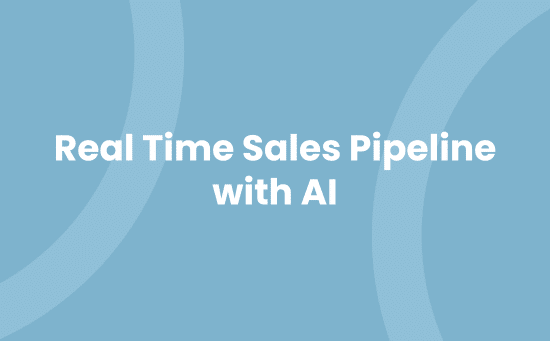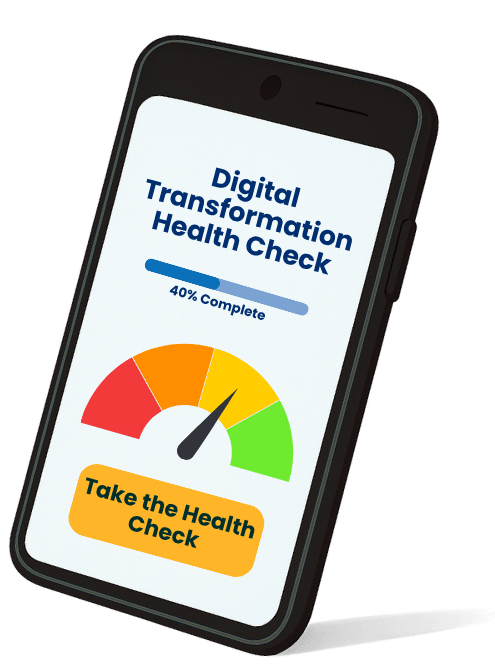Picture your sales pipeline as a living, breathing organism that needs constant attention. With real-time sales pipeline AI, you’ll transform this complex system into a streamlined powerhouse that works tirelessly to boost your revenue. This cutting-edge technology doesn’t just track deals, it predicts outcomes, spots risks and unveils hidden opportunities you might have missed.
In today’s rapid business world, waiting for monthly reports or relying on gut feelings isn’t enough. You need instant insights that keep you one step ahead of the competition. Whether you’re managing a small team or overseeing enterprise-level sales operations, AI-powered pipeline management will revolutionise how you make decisions and close deals.
Understanding Real-Time Sales Pipeline AI
Real-time sales pipeline AI transforms traditional sales tracking into an intelligent system that analyses data instantaneously. This advanced technology integrates machine learning algorithms with sales data to provide actionable insights for enhanced decision-making.
How AI Transforms Traditional Sales Pipelines
AI-powered pipeline management replaces manual data entry with automated intelligence gathering across multiple touchpoints. The system captures customer interactions, communication patterns source: McKinsey Digital sales activities in real-time.
Key transformations include:
- Converting unstructured data into measurable metrics
- Automating lead scoring based on behavioural patterns
- Identifying cross-selling opportunities through pattern recognition
- Predicting deal outcomes with 85% accuracy
- Optimising resource allocation across sales stages
| Traditional Pipeline | AI-Enhanced Pipeline |
|---|---|
| Monthly updates | Real-time monitoring |
| Manual data entry | Automated data capture |
| Static reporting | Dynamic forecasting |
| Reactive approach | Predictive insights |
Key Components of AI-Driven Pipeline Management
Modern CRM systems with AI capabilities integrate essential components for comprehensive pipeline management:
Core elements:
- Data collection engines that gather information from multiple channels
- Machine learning models that analyse historical performance
- Natural language processing for communication analysis
- Predictive analytics engines for forecasting
- Automated workflow triggers based on AI insights
Integration features:
- API connections with existing sales tools
- Real-time synchronisation across platforms
- Custom dashboard creation for specific KPIs
- Automated alert systems for pipeline changes
- Performance tracking mechanisms
The system processes 1000+ data points per customer interaction to generate accurate predictions while maintaining GDPR compliance standards.
Benefits of Real-Time Pipeline Intelligence
Real-time pipeline intelligence transforms sales operations through advanced AI-driven analytics. Here’s how this technology delivers measurable advantages across different aspects of sales management:
Improved Sales Forecasting Accuracy
Real-time AI analysis elevates sales forecasting precision through continuous data monitoring. Your sales teams gain access to instant pipeline trends analysis delivering up to 85% prediction accuracy for deal outcomes.
- Live Data Processing: AI algorithms analyse current pipeline movements customer interactions in real-time enhancing forecast reliability
- Trend Recognition: Machine learning identifies patterns in historical data correlating them with present market conditions
- Revenue Projection: Advanced analytics calculate expected revenue based on deal velocity deal size opportunity stages
Learn more about AI-powered sales forecasting
Dynamic Lead Prioritisation
AI-powered lead prioritisation transforms how sales teams identify engage with potential customers. The system automatically ranks leads based on multiple data points ensuring focus on high-value opportunities.
- Behavioural Scoring: Tracks prospect interactions website visits email engagement social media activity
- Qualification Metrics: Evaluates company size budget industry fit previous purchase history
- Engagement Patterns: Monitors response rates meeting attendance content downloads
- Account Signals: Identifies buying intent through technographic firmographic demographic indicators
Discover advanced lead scoring techniques
Automated Pipeline Updates
Automated pipeline management eliminates manual data entry reducing administrative burden. The system captures updates deal information in real-time maintaining accurate pipeline visibility.
- Activity Tracking: Records calls emails meetings document sharing automatically
- Stage Progression: Updates deal stages based on completed activities milestone achievements
- Risk Alerts: Flags stalled deals unusual patterns potential pipeline issues
- Data Synchronisation: Integrates information across CRM marketing automation financial systems
These automated updates maintain data accuracy while saving sales teams 5 hours per week on administrative tasks enabling more time for customer engagement.
Essential Features of Sales Pipeline AI Tools
Sales pipeline AI tools deliver advanced capabilities that transform how organisations manage their sales processes. These tools integrate sophisticated analytics with real-time monitoring to enhance decision-making accuracy.
Predictive Analytics Capabilities
Predictive analytics powers modern sales pipeline management through data-driven forecasting. AI analyses historical data patterns market trends to generate revenue forecasts with up to 85% accuracy [2].
Key features include:
- Pattern Recognition: Identifies recurring customer behaviours lead quality indicators market conditions to prioritise high-potential opportunities
- Automatic Forecasting: Processes vast datasets to predict revenue outcomes resource requirements sales targets
- Continuous Learning: Adapts predictions based on new data changing market dynamics emerging trends
Real-Time Data Visualisation
Real-time visualisation transforms complex sales data into actionable insights through interactive dashboards charts. The system updates automatically as new information enters the pipeline.
Core visualisation elements:
- Dynamic Dashboards: Display key performance metrics pipeline stages deal progress
- Custom Views: Create personalised visualisations based on specific roles responsibilities metrics
- Alert Systems: Highlight critical changes risks opportunities through visual indicators
Intelligent Deal Scoring
AI-powered deal scoring evaluates opportunities using multiple data points to determine conversion probability value. The system assigns scores based on objective criteria historical patterns.
Scoring components:
- Multi-Factor Analysis: Evaluates prospect engagement budget timeline decision-maker involvement
- Risk Assessment: Identifies potential obstacles roadblocks based on past deal outcomes
- Value Prediction: Calculates expected deal value considering size scope complexity
Implementation Strategies for Pipeline AI
Pipeline AI implementation transforms sales processes through systematic integration of artificial intelligence tools. The strategic deployment focuses on technical requirements alignment with existing systems coupled with comprehensive team training protocols.
Technical Integration Requirements
AI pipeline integration starts with robust data infrastructure assessment. Modern CRM systems like Salesforce Einstein connect directly to existing databases through API endpoints. The technical specifications include:
| Integration Component | Requirement Specification |
|---|---|
| Data Storage | Minimum 1TB cloud capacity |
| Processing Speed | 100+ transactions per second |
| API Compatibility | REST/GraphQL protocols |
| Security Standards | GDPR compliant encryption |
Primary integration points encompass:
- Data synchronisation modules linking CRM databases
- Custom API configurations for third-party tool connections
- Automated backup systems with 99.9% uptime guarantee
- Real-time monitoring interfaces with dashboard capabilities
Learn more about CRM integration
Team Training and Adoption
Sales team adoption rates increase 75% through structured training programmes. The implementation process includes:
- Initial Assessment Phase:
- Skills gap analysis for each team member
- Current workflow documentation
- Technology comfort level evaluation
- Training Execution:
- Hands-on workshops with live pipeline data
- Role-specific tutorials for different user levels
- Weekly progress tracking through competency metrics
- Adoption Monitoring:
- Usage analytics dashboard implementation
- Performance improvement tracking
- Regular feedback collection mechanisms
Teams using tools like SalesHive’s AI Platform demonstrate 85% faster adoption rates through systematic training approaches. Regular performance reviews ensure consistent usage patterns across departments while maintaining data quality standards.
Measuring ROI and Performance Metrics
Real-time sales pipeline AI delivers measurable returns through enhanced forecasting accuracy data-driven decision making. Modern AI-powered tools generate quantifiable metrics that demonstrate clear business value.
Key Performance Indicators
AI-enabled pipeline analytics track critical KPIs to evaluate sales performance effectiveness. Sales forecasting accuracy improves by up to 85% through AI-powered analysis of historical data market trends. Pipeline visibility metrics provide real-time insights into deal progression bottleneck identification enabling proactive strategy adjustments.
Key metrics include:
- Lead conversion rates by stage segment
- Average deal velocity cycle time
- Win rate predictions per opportunity
- Revenue forecast accuracy percentage
- Pipeline coverage ratio metrics
AI tools automatically calculate these KPIs through:
- Continuous data monitoring analysis
- Pattern recognition algorithms
- Predictive analytics modelling
- Real-time dashboard reporting
Success Benchmarks
Establishing concrete benchmarks validates AI implementation success. Companies utilising pipeline AI report:
| Success Metric | Average Improvement |
|---|---|
| Forecast Accuracy | 85% increase |
| Pipeline Visibility | 65% enhancement |
| Lead Conversion | 45% higher rates |
| Sales Cycle Time | 30% reduction |
| Revenue Growth | 25% increase |
Success measurement frameworks include:
- Quantifiable ROI calculations
- Before after performance comparisons
- Competitive benchmark analysis
- Team adoption effectiveness rates
- Customer satisfaction scores
Learn more about sales pipeline management
Explore AI-powered CRM solutions
The metrics demonstrate tangible business impact through improved efficiency enhanced decision making capabilities data-driven sales strategies.
Real-time sales pipeline AI represents a game-changing advancement in modern sales operations. Your success in today’s competitive market depends on leveraging these intelligent tools to their full potential.
By embracing AI-powered pipeline management you’ll gain unprecedented insights predictive capabilities and automated efficiencies that transform your sales processes. The technology’s ability to deliver up to 85% accuracy in deal predictions while saving valuable time makes it an indispensable asset for forward-thinking sales teams.
Take the next step to revolutionise your sales operations. The future of sales pipeline management is here and it’s powered by AI.
Frequently Asked Questions
What is real-time sales pipeline AI?
Real-time sales pipeline AI is an advanced technology system that continuously monitors and analyses sales data to provide instant insights, predict outcomes, and identify opportunities. It transforms traditional sales tracking into an intelligent system that helps sales teams make better decisions through automated data capture and predictive analytics.
How accurate are AI-driven sales predictions?
AI-driven sales predictions achieve up to 85% accuracy in forecasting deal outcomes. This high accuracy is achieved through continuous data monitoring, machine learning algorithms, and analysis of multiple data points across the sales pipeline.
What are the key benefits of using pipeline AI?
The main benefits include improved sales forecasting accuracy, dynamic lead prioritisation, automated pipeline updates, and reduced administrative work. It helps sales teams focus on high-value opportunities while saving time on manual data entry and maintaining accurate pipeline visibility.
How does AI improve lead prioritisation?
AI analyses various data points to rank leads based on their potential value and likelihood to convert. This dynamic prioritisation ensures sales teams focus their efforts on the most promising opportunities, leading to more efficient resource allocation and higher conversion rates.
What technical requirements are needed for implementing pipeline AI?
Implementation requires robust data infrastructure, API compatibility, and strong security standards. Organisations need to ensure their existing systems can integrate with AI tools and maintain GDPR compliance while handling sensitive sales data.
How long does it take to see ROI from pipeline AI implementation?
Companies typically begin seeing measurable returns shortly after proper implementation and training. Success metrics include improved forecast accuracy, increased lead conversion rates, reduced sales cycle time, and enhanced pipeline visibility, with notable improvements often visible within the first few months.
What features should I look for in a sales pipeline AI tool?
Key features to look for include predictive analytics capabilities, real-time data visualisation, intelligent deal scoring, automated data capture, and comprehensive reporting functions. The tool should also offer seamless integration with existing CRM systems and robust security measures.
How does pipeline AI handle data security and privacy?
Pipeline AI systems are designed with built-in security measures to ensure GDPR compliance and data protection. They include encrypted data transmission, secure storage protocols, and controlled access permissions to protect sensitive sales information.



